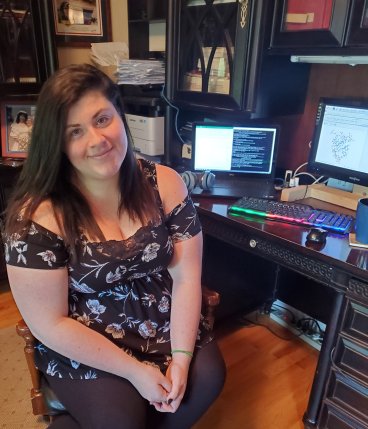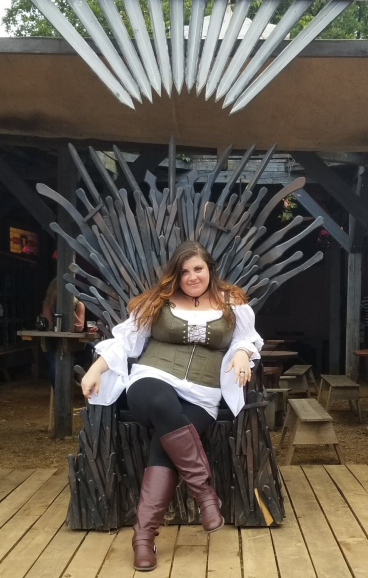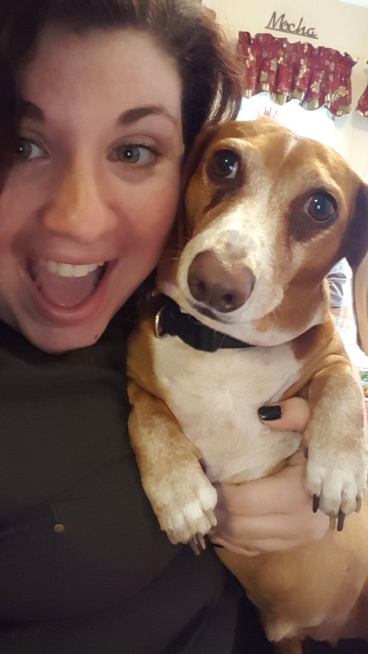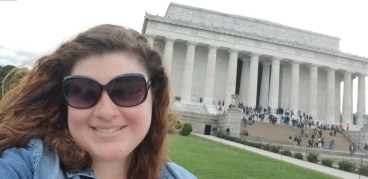Meet CTC: Meghan McGreal

April 30, 2020 -- Meghan McGreal is a 5th-year graduate student in the Goodpaster Group. For her undergraduate degree in chemistry, Meghan attended the University of North Carolina at Asheville. In Fall 2019, she was a Community Faculty at Metropolitan State University, where she taught a general chemistry course. She also has teaching experience at the University of Minnesota, where she was the head TA for general chemistry for five semesters. After completing her graduate program, she wants to become a professor at a primarily undergraduate institution so she can continue to pursue her passion for undergraduate education.
All of her current projects are based around modeling transition metal catalysis. Her main project is on modeling the active site of FeNi Hydrogenase, which catalyzes the reversible reaction of hydrogen into protons and electrons. The real-world applications of this are, broadly, the possibility for a new source of energy inspired by nature. If scientists can figure out exactly what makes this enzyme work, they can not only learn more about enzyme chemistry, but also potentially derive bio-inspired catalysis.
She also has a couple of collaborative projects with the Tonks and Pierre Groups, where she provides computational insight for their experiments to give a comprehensive picture of the chemistry happening.
For her research, Meghan mostly uses the Gaussian computer software for her calculations and density functional theory (DFT) to study her systems. She works with models as large as 150 atoms, which provides some challenges when studying chemical reactions at the electronic level.

In Meghan’s free time, she enjoys reading and gaming. She is an avid fan of the fantasy genre, and always travels with at least 2 novels in tow. As far as gaming, she is involved in a Dungeons and Dragons campaign with her research group, which she enjoys tremendously. She also likes playing board games with people, from classics like Risk and Clue to more complex ones like Scythe. Finally, she loves video games, especially Nintendo games, like Pokemon and the Legend of Zelda franchise.
Why did you choose the University of Minnesota, and what led you to join your current research group?
The culture of the UMN Department of Chemistry sold me. The UMN is one of the few places that put a very large emphasis on mental health, and I could tell during my visit weekend that the Department cares more about collaboration than competition. Also, you would be hard-pressed to find another school with six different computational/theoretical chemistry faculty that span so many different fields.
I actually joined the Goodpaster group before Jason was officially a faculty member. I met him during graduate student orientation and thought the research he wanted to do with WFT-in-DFT embedding was interesting. I also found that I enjoyed discussing science with him. The idea of being a founding group member where I get to help build the group and assist in establishing the culture of the group was also appealing.
What is your favorite part about living in the Twin Cities?
I love all the events that are always going on in the Twin Cities! For example, I have gone to the State Fair every year during graduate school and loved it every time. Other events I have enjoyed are the Stone Arch Bridge Festival, where local artists display and sell their work and have live music, and the Winter Beer Dabbler, which is the largest outdoor craft beer festival, among others.
I also love musicals and drag shows, and there are so many opportunities to see both in the Cities! I had a season pass to the Orpheum Theater in downtown Minneapolis, where I got to attend many of the traveling Broadway shows, including Hamilton and Dear Evan Hansen. I am an avid fan of RuPaul’s Drag Race, and I have gotten to see many of the contestants from the show perform in both Minneapolis and Saint Paul. I also was able to take advantage of the local drag scene, where I have attended drag brunch at Union Rooftop and other downtown venues with regular drag shows.

How did you become interested in studying chemistry, and what gets you the most excited about your field?
I actually stumbled into the field of chemistry by chance. I went to college wanting to be a math major with a pre-medical field focus, but found myself enjoying my chemistry classes more than my math classes. My general chemistry teacher noticed my interest in the subject and invited me to a dinner they were having for prospective chemistry majors. Conversations with one of the faculty resulted in placement in his research group, where I started doing computational chemistry research in my freshman year and continued ever since.
Teaching chemistry is my passion, which I discovered as an undergrad. Many people, when you tell them you are a chemist, respond with “that’s impressive. I could never do chemistry - it’s too hard,” but I disagree. I think with enough time and hard work, anyone can do chemistry. What excites me most about the field is being able to share my knowledge of the subject with others. My favorite part is seeing that “lightbulb moment” where you can see that they understand what you are explaining, whether it be in my general chemistry classes or mentoring undergraduate students in computational chemistry research.
What do you enjoy most about your research? What has been your most interesting or surprising finding so far?
What I enjoy most about my research is being able to describe what is happening on the atomistic level in order to help experimentalists understand what is happening in the lab, and also being able to delve into the various fields of chemistry. Throughout my computational chemistry career, I have been involved in biochemistry, inorganic chemistry, and even organic chemistry through the various projects I have had, so I have been able to dabble in just about every field of chemistry through the lens of physical chemistry.
My most interesting finding to date is related to my Ti-Catalysis collaboration project with the Tonks Group. We were exploring the reaction path with all of the possible ligand combinations that could have occurred based on the compounds used for synthesis. I actually found that the coordination of the azobenzene ligand caused stabilization of the Ti center through back donation, and made it so that the reaction, which was shown to undergo a reduction upon product release from a Ti4+ to an unstable Ti2+ for most of the pathways, negated this reduction and remained in the Ti4+ oxidation state upon product release. This is an unusual and unexpected catalytic transformation.

What are you most proud of about your academic career so far, and what’s one thing you’d like to achieve in the future?
I am most proud of the poster presentation awards I have received for presenting my FeNi Hydrogenase work. I am very excited about the progress and understanding I have been able to find through my years of research, and I love talking to people about this project. It was really rewarding to be recognized for the years of work I have done, but also to be recognized for my ability to communicate my science with others and get them just as excited about my project as I am.
One thing I would like to achieve is the creation of a computational chemistry curriculum for undergraduate students to supplement their foundational chemistry classes using open source programs. For example, students could calculate and plot the energetics of Newman Projections for simple organic molecules or create and visualize electrostatic surfaces to show intermolecular forces.
What drives you to be a better scientist?
My passion for chemistry is in education, so what drives me to be a better scientist is to have a deep and detailed understanding of whatever I am studying so I can share that knowledge with and teach others, whether they are other fellow scientists or a general audience.
What single world problem would you like to solve with your research?
I would like to help find sustainable, renewable energy sources to replace the coal and oil-based nonrenewable and environmentally harmful sources that make up the majority of our energy sources currently.
What advice, if any, do you have for aspiring scientists?
Be patient with yourself. Not everything works the way you expect it to, but there is always something to learn from what you have done.
